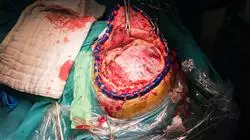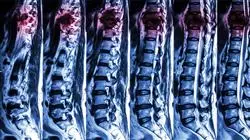University certificate
The world's largest faculty of medicine”
Introduction to the Program
A comprehensive program that will help you keep up to date with the latest techniques in Neurosurgery”

In recent years, the interaction of Neurosurgery with new technologies has not only led to a better knowledge of brain pathology, but also to an optimization of the treatments performed with a decrease in morbimortality and an improvement in the results. The expansion of knowledge in neurosciences in the last decades, together with technological innovations that have resulted in important diagnostic and therapeutic advances, have transformed Neurosurgeryinto a specialty with multiple subspecializations, with the aim of improving the quality of care for Neurosurgery patients.
From this perspective, the Professional master’s degree in Neurosurgery is an up-to-date overview of the pathologies that can be studied and treated by Neurosurgery, as well as the perspective it can offer to other specialties. The application of diagnostic and therapeutic algorithms enhances student learning and synthesizes the flow of information to facilitate its practical application in the student's environment.
On the other hand, the multimedia content developed with the latest interactive educational technology enhances the adoption of problem-solving strategies by students. This way, the student will acquire the necessary skills to approach the diagnosis and treatment of neurosurgical pathologies.
For this reason, this Professional master’s degree is the most intensive and effective educational program on the market in this field. A high level of training that will allow you to become one of the most up-to-date professionals in the sector, in a field with a high demand for professionals.
Expand your knowledge through this Professional master’s degree in Neurosurgery that will allow you to specialize with a view to achieving excellence in this field"
This Professional master’s degree in Neurosurgery contains the most complete and up-to-date scientific program on the market. The most important features include:
- Practical cases presented by experts in neurosurgery
- The graphic, schematic, and practical contents with which they are created, provide scientific and practical information on the disciplines that are essential for professional practice
- The latest developments in neurosurgery
- Practical exercises where the self-assessment process can be carried out to improve learning
- Special emphasis on innovative methodologies in neurosurgery
- Theoretical lessons, questions to the expert, debate forums on controversial topics, and individual reflection work
- Content that is accessible from any fixed or portable device with an internet connection
Expand your knowledge through this Professional master’s degree in Neurosurgery that will allow you to specialize with a viNeurosurgeryew to achieving excellence in this field"
The teaching staff includes medical professionals who bring their experience to this program, as well as renowned specialists from leading societies and prestigious universities.
The multimedia content, developed with the latest educational technology, will provide the professional with situated and contextual learning, i.e., a simulated environment that will provide an immersive training experience designed to train for real-life situations.
This program is designed around Problem-Based Learning, whereby the professional must try to solve the different professional practice situations that arise throughout the program. For this purpose, the specialist will be assisted by an innovative interactive video system that was created by renowned and experienced experts in Neurosurgery with extensive experience.
Do not hesitate to take this training course with us. You will find the best teaching material with virtual lessons"

This 100% online Professional master’s degree will allow you to combine your studies with your professional work while increasing your knowledge in this field"
Why study at TECH?
TECH is the world’s largest online university. With an impressive catalog of more than 14,000 university programs available in 11 languages, it is positioned as a leader in employability, with a 99% job placement rate. In addition, it relies on an enormous faculty of more than 6,000 professors of the highest international renown.

Study at the world's largest online university and guarantee your professional success. The future starts at TECH”
The world’s best online university according to FORBES
The prestigious Forbes magazine, specialized in business and finance, has highlighted TECH as “the world's best online university” This is what they have recently stated in an article in their digital edition in which they echo the success story of this institution, “thanks to the academic offer it provides, the selection of its teaching staff, and an innovative learning method aimed at educating the professionals of the future”
A revolutionary study method, a cutting-edge faculty and a practical focus: the key to TECH's success.
The most complete study plans on the university scene
TECH offers the most complete study plans on the university scene, with syllabuses that cover fundamental concepts and, at the same time, the main scientific advances in their specific scientific areas. In addition, these programs are continuously being updated to guarantee students the academic vanguard and the most in-demand professional skills. In this way, the university's qualifications provide its graduates with a significant advantage to propel their careers to success.
TECH offers the most comprehensive and intensive study plans on the current university scene.
A world-class teaching staff
TECH's teaching staff is made up of more than 6,000 professors with the highest international recognition. Professors, researchers and top executives of multinational companies, including Isaiah Covington, performance coach of the Boston Celtics; Magda Romanska, principal investigator at Harvard MetaLAB; Ignacio Wistumba, chairman of the department of translational molecular pathology at MD Anderson Cancer Center; and D.W. Pine, creative director of TIME magazine, among others.
Internationally renowned experts, specialized in different branches of Health, Technology, Communication and Business, form part of the TECH faculty.
A unique learning method
TECH is the first university to use Relearning in all its programs. It is the best online learning methodology, accredited with international teaching quality certifications, provided by prestigious educational agencies. In addition, this disruptive educational model is complemented with the “Case Method”, thereby setting up a unique online teaching strategy. Innovative teaching resources are also implemented, including detailed videos, infographics and interactive summaries.
TECH combines Relearning and the Case Method in all its university programs to guarantee excellent theoretical and practical learning, studying whenever and wherever you want.
The world's largest online university
TECH is the world’s largest online university. We are the largest educational institution, with the best and widest online educational catalog, one hundred percent online and covering the vast majority of areas of knowledge. We offer a large selection of our own degrees and accredited online undergraduate and postgraduate degrees. In total, more than 14,000 university degrees, in eleven different languages, make us the largest educational largest in the world.
TECH has the world's most extensive catalog of academic and official programs, available in more than 11 languages.
Google Premier Partner
The American technology giant has awarded TECH the Google Google Premier Partner badge. This award, which is only available to 3% of the world's companies, highlights the efficient, flexible and tailored experience that this university provides to students. The recognition as a Google Premier Partner not only accredits the maximum rigor, performance and investment in TECH's digital infrastructures, but also places this university as one of the world's leading technology companies.
Google has positioned TECH in the top 3% of the world's most important technology companies by awarding it its Google Premier Partner badge.
The official online university of the NBA
TECH is the official online university of the NBA. Thanks to our agreement with the biggest league in basketball, we offer our students exclusive university programs, as well as a wide variety of educational resources focused on the business of the league and other areas of the sports industry. Each program is made up of a uniquely designed syllabus and features exceptional guest hosts: professionals with a distinguished sports background who will offer their expertise on the most relevant topics.
TECH has been selected by the NBA, the world's top basketball league, as its official online university.
The top-rated university by its students
Students have positioned TECH as the world's top-rated university on the main review websites, with a highest rating of 4.9 out of 5, obtained from more than 1,000 reviews. These results consolidate TECH as the benchmark university institution at an international level, reflecting the excellence and positive impact of its educational model.” reflecting the excellence and positive impact of its educational model.”
TECH is the world’s top-rated university by its students.
Leaders in employability
TECH has managed to become the leading university in employability. 99% of its students obtain jobs in the academic field they have studied, within one year of completing any of the university's programs. A similar number achieve immediate career enhancement. All this thanks to a study methodology that bases its effectiveness on the acquisition of practical skills, which are absolutely necessary for professional development.
99% of TECH graduates find a job within a year of completing their studies.
Professional Master's Degree in Neurosurgery
Over the years, the medical field has evolved and today it encompasses different branches, among them, neurosurgery, a science used to treat diseases affecting the central and peripheral nervous system. This in turn is complemented by neurology, oncology, psychiatry, otolaryngology and orthopedic and maxillofacial surgery. To meet the academic needs and help boost the careers of physicians who wish to specialize in this sector; at TECH we developed a Professional Master's Degree in Neurosurgery. An online program of high academic level focused on knowing the latest surgical techniques necessary to perform as a neurosurgeon. You will specialize in expanding all the knowledge related to this field; in addition, you will have within reach the latest diagnostic and therapeutic guidelines based on the most updated scientific evidence. This will allow them to learn all about the general concepts in neurosurgery, which covers the treatment of various pathologies such as cranioencephalic trauma, subarachnoid hemorrhage and intracranial infection.
Earn a Professional Master's Degree from the largest medical school in the world.
During 1,500 hours you will be prepared with the best tools and techniques to perfect the practice of your profession. At TECH you will find the most advanced educational technology on the market, since the content and methodology of this curriculum has been designed by a team of professionals dedicated to the medical sector. This makes it easy to take your program with the most optimal theoretical and practical methods. You will learn in depth the technological innovations that have contributed to the diagnostic and therapeutic advances in neurosurgery, designed with the objective of improving the quality of care for patients... Because of this, you will delve into the treatment of problems such as vascular malformations, the neurosurgical procedure of stroke and spinal pathology, tumors and degenerative spine.
Specialize in neurosurgery
All physicians who wish to revalue their professional profile and improve their skills will find in TECH the ideal option to boost their career growth. We have unique online teaching methods in the market that will allow them to develop the Postgraduate Certificate in a completely autonomous way. They will have the necessary basis to become experts in diagnosing and treating neurosurgical pathology in a completely new way. In addition, you will be able to participate in discussion forums to exchange ideas and/or study approaches.







